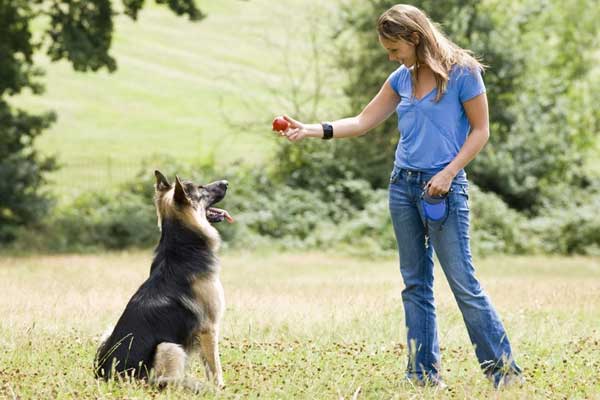Do German Shepherds Bark a Lot? Shockingly Loud or Sweetly Quiet?
German Shepherds are known for being loyal, intelligent, and alert dogs. But one of their most recognizable traits is also one of the biggest complaints from owners: they bark a lot! German Shepherds were bred to be working dogs, so barking comes naturally.
They use it to communicate with their humans and protect them from potential danger. But excessive barking can become an issue if not addressed properly. So why do German Shepherds bark so much? How can you train your dog to reduce its barking habits? And what health issues might be causing your dog’s excessive barking?
We answer all these questions in this article about Do German Shepherds Bark a Lot.
Do German Shepherds Bark a Lot?
Yes, German Shepherds are known for their barking and are considered one of the noisiest breeds. German Shepherds bark when they sense potential danger, to alert their owners, or simply out of boredom if they don’t get enough mental and physical exercise.
They may also bark at visitors who come to the house or strangers on walks. There are better choices than German Shepherds if you’re looking for a low-barking breed. German Shepherds excessive barking can become a serious behavior problem if left unchecked.
However, if you provide them with the right amount of exercise, mental stimulation, and training, they can learn to control their barking.
7 Reasons Why Do German Shepherds Bark So Much
1. German Shepherds are very vocal
German Shepherds are known for their vocal nature and love to express themselves through barking. This is part of their natural instinct, triggered by danger or fear.
However, the level of barking can vary greatly depending on how much training the dog has received. This breed was initially bred with a specific purpose: herding and protecting the flocks of sheep.
Therefore, barking was used to help keep the herders in line and alert their owners if something was wrong.
2. Boredom and Lack of Mental Stimulation
German Shepherds are bred to be active and engaged for hours daily, performing difficult tasks with their owners. They need ample exercise to stay happy, healthy, and mentally stimulated.
German Shepherds may become bored without regular exercise and develop destructive behaviors like barking excessively. To ensure your pet gets physical and mental stimulation, give them plenty of activities, toys, puzzles, and regular daily exercise.
This will give your pup a stimulating environment to stay content and healthy.
3. Separation Anxiety
Separation anxiety can be incredibly distressing for German Shepherds, leading them to excessively bark or howl when left alone. This behavior expresses distress and loneliness and should not be dismissed as ‘annoying’ or ‘unwanted.’
In many cases, this barking or howling occurs in persistent patterns that can become difficult to ignore, so it’s crucial to find a way to manage the problem.
4. Want Your Attention
Our German Shepherds love having our attention, so they may bark or whine when they feel they are not getting enough of it.
They don’t know any other way to get your attention! Their barking can be seen as asking for attention since spending time with their favorite humans is always at the top of their list.
5. Sickness or pain
Sickness or pain can have a massive effect on German Shepherds physically and behaviorally. If a German Shepherd is in discomfort, it may bark excessively out of distress or even aggression.
Recognizing the signs of health issues and ruling out any medical concerns causing the barking before attempting anything else is essential.
6. Lonely or scared
A German Shepherd may bark out of fear or worry when feeling lonely or scared. This barking can come from general feelings of loneliness or even more extreme cases where the animal is dealing with severe separation anxiety.
This behavior can range from barking when you are walking out the door to throughout the day when you are gone or even when they have segregated from you in their cage or any other area.
It’s crucial to ensure that your pet receives enough attention and affection, as this can help reduce the feelings of loneliness or worry that cause excessive barking.
7. Excited barking
German Shepherds are a dog that is well known for their energetic, spirited personalities. They often express their excitement and emotions through barking, especially when they’re excited to see or interact with their owners.
When they anticipate something fun such as a walk or playtime, German Shepherds often bark enthusiastically, showing excitement for the upcoming activity. It’s an attractive trait and a great way to bond with your dog.
Train a German Shepherd to Not Bark
Training a German Shepherd not to bark requires patience and effort, but with the proper techniques and a lot of repetition, it is possible to reduce excessive barking effectively.
Understand the causes: Some German Shepherds bark more than others for various reasons, like fear, anxiety, or boredom. Once the root cause of the excessive barking is identified and alleviated, training can start. Here are some tips for training a German Shepherd not to bark:
Avoid using a muzzle or anti-bark collar: Although these may be effective in some cases, they are often seen as cruel and do not address the underlying problem.
Quiet Command: A command such as “No bark” or “Quiet” should be used whenever the dog barks excessively. When the dog stops barking, reward them with praise and treats. Eventually, they will understand that when they hear the command “Quiet,” they can choose to stop barking and receive positive reinforcement.
Socialize at an early age: German Shepherds that have been socialized since a young age is less likely to bark excessively as they are comfortable around people and other animals.
Lots of exercises: A tired dog is a happy dog! Take your German Shepherd for regular walks, hikes, and playtime – this will help to keep them from getting bored and restless.
Desensitize: If your German Shepherd barks excessively when they encounter specific triggers, such as loud noises or the presence of other animals, you should slowly desensitize them over time.
Avoid shouting or yelling: This can agitate the dog and make them bark more. Instead, use a calm, firm voice to let them know when they have done something wrong.
Common Health Issues Associated with Excessive Barking in German Shepherds
Common Health Issues Associated with Excessive Barking in German Shepherds
Vocal Cord Dysfunction: This disorder can cause German Shepherds to bark excessively without being able to control their vocalizations. Symptoms may include a hoarse or breathy bark, an intermittent or continuous barking pattern, and difficulty breathing while barking.
Thyroid Issues: Dogs with thyroid issues may bark excessively due to hormone imbalance. Symptoms include weight loss, hair loss, excessive thirst or urination, and barking.
Pain: Dogs may bark excessively if in pain or discomfort due to an underlying health issue such as arthritis or injury. Difficulty walking, limping, or holding up a limb are all signs that your dog may be in pain and should be taken to the vet for an evaluation.
Hearing Loss: Deafness or other hearing-related issues can cause dogs to bark excessively because they cannot hear their environment and may become anxious or distressed.
Signs of hearing loss include not responding when called, appearing startled by loud noises, or not reacting to commands given previously.









